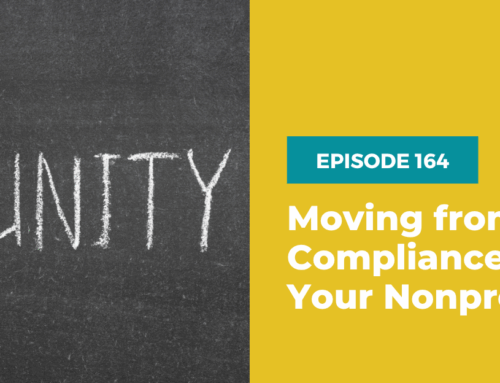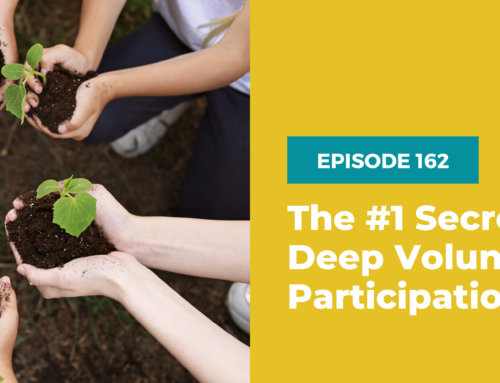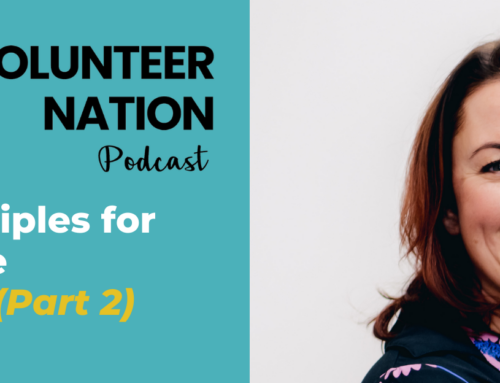
December 5, 2024
Episode #139: Unpacking Volunteer Retention Issues: A Case Study
In this episode of the Volunteer Nation podcast, Tobi unpacks volunteer retention issues using a real-life case study from a Reddit post titled ‘I’m never volunteering for a food bank ever again.’ Tobi reads the post in its entirety and offers a detailed analysis based on research and expert insights.
Key points include the importance of person-task fit, managerial treatment, organizational support, and psychological contract theory. The episode also touches on the broader implications of poor volunteer experiences and offers practical strategies for improving volunteer satisfaction and retention!
Volunteer Retention Issues – Episode Highlights
- [00:57] – Introduction to Today’s Case Study
- [02:50] – Reading the Reddit Post
- [04:50] – Analyzing Volunteer Retention Issues
- [06:26] – Person-Task Fit and Managerial Support
- [12:49] – Psychological Contracts in Volunteering
- [23:03] – Community Impact and Final Thoughts
Volunteer Retention Issues – Quotes from the Episode
“It’s important for our organizations to be honest about what we can offer our potential volunteers right from the get-go, and to be clear and offer those things when volunteers show up.”
Helpful Links
About the Show
Nonprofit leadership author, trainer, consultant, and volunteer management expert Tobi Johnson shares weekly tips to help charities build, grow, and scale exceptional volunteer teams. Discover how your nonprofit can effectively coordinate volunteers who are reliable, equipped, and ready to help you bring about BIG change for the better.
If you’re ready to ditch the stress and harness the power of people to fuel your good work, you’re in exactly the right place!

Contact Us
Have questions or suggestions for the show? Email us at wecare@volpro.net.
Rate, Review, & Follow Us on Apple Podcasts
If you love the content Tobi shares on the Volunteer Nation podcast, consider rating and reviewing the show! This helps us reach more people – and help more good causes just like yours – successfully engage enthusiastic, dedicated volunteers with less stress and more joy.
Click here, scroll to the bottom, tap to rate with five stars. Then, select “Write a Review” and let us know what you loved most about this episode!
Also, if you haven’t done so already, follow the podcast so you don’t miss a thing. Follow now!
Subscribe to ProNews: Our Weekly Resource Roundup
If you’d like to stay up to date on all new podcasts, blogs, freebies, and deals posted on our Tobi Johnson & Associates and VolunteerPro websites, subscribe to our weekly ProNews newsletter.
Every Wednesday, we’ll send you a digest of our freshest content, plus a bonus! Once you confirm your subscription, you’ll get our [Free eBook] The New Volunteer Manager: The First 90 Days.
Episode #139 Transcript: Unpacking Volunteer Retention Issues: A Case Study
Tobi: Hey everybody, welcome to another episode of the volunteer nation podcast. I am excited. For today’s episode, because it’s kind of a real-life case study. Now it’s a little bit heartbreaking because we must learn some not so wonderful truths about our field and what happens when volunteers join our organizations. But we can learn a lot from this episode and this case study.
So, I want to do it. Let’s do it. So today we’re going to unpack volunteer retention issues with a case study. And here’s what happened. I was poking around on the internet the other day and I came across a Post kind of a rant on Reddit. There’s a true off my chest rant thread that I Was just poking around on for whatever reason.
I don’t know why I came across this. You know how it is, but I found this post both disheartening and fascinating. I thought we’d use it for a case study today, so we could diagnose retention issues. I want to share what I see as an expert in the comments that this volunteer makes. And take us sort of beyond just simply, oh, this volunteer isn’t happy with their volunteer role. And maybe this model or the way I’m looking at things might help you think about your volunteers.
I often hear from organizations that they are unable to keep newly recruited volunteers from coming back. They join for a shift and then disappear, and staff are confused about this. They don’t know what happened. No one shares with them and they’re just not, don’t have a clue about why this is happening to them repeatedly.
So, again, let’s look at a case study that illustrates exactly what happens from a volunteer’s perspective and we’re going to hear from their own words. It’s going to be really interesting, and I hope that it will help you think about volunteer retention and maybe new ways. of looking at the comments your volunteers are sharing with you.
So, let’s get into it. So, this Reddit post was called, the title of it was, I’m never volunteering for a food bank ever again. It was posted about five months ago. And I’m going to read it in entirety, and then I’m going to go back and go through its section by section and tell you, my analysis. Okay, in terms of what research says, and in terms of what we are seeing in this volunteer’s experience.
Okay, so I’m going to read it first in entirety. So here it is. I volunteered for a food bank, and it was a bad decision. At the very start. Everybody runs to their stations for the job they’ll be doing. Being this was my first time; I was confused why everyone was running. Then when I got to the station I had left over, I realized it’s because they wanted the easy jobs.
I was stuck lifting heavy boxes by myself and opening them while well, they got the easy job of just adding food to bags. They were laughing and joking the whole time while I was running like a chicken with its head cut off. Plus, they were getting a little angry because I was so busy and wasn’t stalking them fast enough.
Then one person had to use the bathroom, so not only did I have to do my job, I had to also do their job as well. After it was all finished, a person was like, quote, this is their quoting what the other person said, they said, I could take some candy home with me to give to my kids. So just leave some behind for me.
I said no, but she took some anyways. Never will I volunteer to give to my kids. ever again. Pretty heartbreaking, right? This person came in, they wanted to give their time and talent, and they had a horrible experience. I really hope this doesn’t happen at your organization, but I suspect if you’re losing volunteers and they’re not coming back, then That it is.
So, let’s look at this step by step. And as a consultant and advisor to nonprofit organizations around their volunteer engagement, I always look at things from a slightly different angle. Usually from research back. Back to the angle, plus based on my years of experience. But let’s get into the analysis of this because it might help you think about exactly what happened here.
It’s beyond and way beyond just satisfaction. This volunteer was not satisfied, but there’s so much more going on in the emotions and attitudes and perceptions of this volunteer that I think we need to understand. After all, we are asking people to sacrifice their time. And sometimes spend a little bit of money to come and support our organizations.
And that is worth something. I think it’s worth making sure that we give every one of those supporters the best experience possible. So, let’s look at this. So, let’s talk about it. So, let’s talk about what this volunteer’s comments say about this organization’s retention issues. First, let’s pick through the first comment.
I was stuck lifting heavy boxes by myself and opening them while they got the easy job of just adding food to bags. They were laughing and joking the whole time while I was running like a chicken with its head cut off. Plus, they were getting a little angry because I was so busy. and wasn’t stalking them fast enough.
Okay, so let’s unpack this volunteer retention issue. This issue at core is about person task fit. So, person task fit refers to the alignment between the volunteer’s capabilities and preferences and the tasks that they are assigned. When there is a good alignment. person task fit, it means that the volunteer skills and interests match well with the responsibilities they’re given, which is associated with higher retention rates.
So first off, we have a volunteer who heavy boxes. Transcript may not be, they may not have the physical strength to lift heavy boxes. Plus, they don’t have an idea about where the boxes are and how to stock them efficiently. So, they felt unprepared, and they felt a little bit angry about it. Person task fit is important even when you’re having volunteers come in for episodic roles or short-term roles.
We want to ask them and take a little bit of time and understand. What they’re able to do and capable of doing and what they’re not comfortable doing. Because if they are stuck doing something they’re not comfortable doing, then you know what? They’re probably not going to come back. The other thing I see in this comment is there’s an issue with managerial treatment and overall organizational support, which also impacts on volunteer retention and satisfaction.
Some of the positive influences of managerial treatment and overall organizational support are recognition and sufficient training. So, when volunteers receive enough training and they are recognized and acknowledged for their work, these practices positively influence volunteer retention and help keep volunteers engaged and motivated.
So, you think about this volunteer, they first didn’t feel capable of the job. They also When, when they say they were running around like a chicken with its head cut off, it means that they weren’t clear on what system was most efficient and they didn’t feel like they were being able to stop quickly enough.
So, they didn’t really feel supported. My question in this situation is, where is the team leader here? Whether it’s a volunteer or a paid staff person who is helping someone get accustomed, who Following up and helping back them up if they’re unable to complete their task in the way that’s expected by everybody else.
Seems like this person got stuck in a sink or swim situation, which is not how we want our volunteers to feel. Let’s go on to another statement that this volunteer makes. Then one person had to use the bathroom. So not only did I have to do my job, I had to do their job as well. So, let’s unpack this volunteer retention issue.
Again, it’s about managerial treatment and overall organizational support. So, in this case we have a negative influence and that is, and it was negative before. But this is about something that is present, not absent. Before there was an absence of support from the organization, clarity on how to do the job, someone being backed up.
In this case, it’s that there’s the presence of indifference. Indifference from staff towards volunteers can negatively affect retention. So, you think about how lonely this volunteer feels when they’re trying to get the work done as fast as they can, and now they’re having to do two people’s job because there’s not enough people to do the work.
And so, what happens? This volunteer doesn’t come back. They’re frustrated. They don’t want to feel less than because they came here, hey, to help, make a difference, and they don’t feel like they’re making a difference. And so, in this way, this is impacting this volunteer negatively and all the work that went into recruiting them disappears and it’s no longer relevant anymore because they’re not coming back.
So, it was a waste of time and effort on everybody’s part. We’ve really got to make sure that our volunteers feel supported, that they feel like we care, and that we’re there to back them up in the event that there’s not enough hands-on deck. I have a couple of other retention strategies I also shared in an earlier Volunteer Nation episode, Volunteer Nation episode 99, volunteer retention strategies, two big mistakes.
These two mistakes are around communicating the wrong norms to volunteers. and not tapping the emotional side of the brain. And as you can see from this volunteer, there’s a lot of emotion there in their comments and you feel bad for them. After all, they took time out of their busy day to help this organization out and they left feeling not so great about themselves and super disappointed with their experience.
So check out that episode. I’ll link to it in the show notes. So, let’s take a quick pause for my case study of what’s plaguing this particular nonprofit in terms of volunteer retention issues. When we come back, I’m going to talk about psychological contracts and how I see these psychological contracts being breached for this volunteer. So don’t go anywhere.
Volunteer Pro Premium Membership
Hey, if you’re enjoying this week’s episode of Volunteer Nation, we invite you to check out the Volunteer Pro Premium Membership. This community is the most comprehensive resource for attracting, engaging, and supporting dedicated, high impact volunteer talent for your good cause.
Volunteer Pro Premium Membership helps you build or renovate an effective volunteer program for your community. with less stress and more joy so you can ditch the overwhelm and confidently carry your vision forward. And it’s the only implementation program of its kind that helps your organization build maturity across five phases of our proprietary system, the volunteer strategy success path. If you’re interested in learning more, visit volpro.net/join
Okay, we’re back with my case study of volunteer retention issues from the words of a volunteer. This volunteer clearly experienced multiple psychological contract breaches in addition to issues with person task fit, issues with lack of organizational support.
Issues with managerial treatment. A lot of issues already we’ve called out in their comments, but I also want to talk about psychological contracts. Now if you’re not familiar with psychological contract theory, psychological contracts are the expectations. beliefs, ambitions, and obligations that a volunteer forms when they join your organization.
This happens with everyone. Psychological contract theory really started in the employment space, but it has been well researched in the volunteer space. In fact, if you check out Episode, Volunteer Nation, Episode 101, The Power of Psychological Contracts. I talk with my friend, Pam Kappelides, who has done extensive research around this and has written a meta study, which is the study of studies of psychological contract theory.
I’ll link to it in the show notes but check that out if you want to learn more about psychological contracts. But what’s interesting to me is how these expectations are set. When you think about your own volunteers, when you look at your website, what does it say? It probably says things like, come and give back to your community, come and have fun, make a difference.
There’s probably photographs on your website that show these things in action. So, when a prospective volunteer sees those, they start to build out these perceptions. These psychological contracts start to form, and volunteers start to have a conception of what they’re going to get back from the volunteering that they’re going to engage in.
So, if I go to this organization, they may say to themselves, I’m going to be able to give back to my community. I’m going to have fun. I’m going to develop skills perhaps. But what happens often is they start volunteering and perhaps this doesn’t happen. And they start to see that life is a little bit different than they imagined.
They start to have perceptions that are not, and expectations that are not met. So, it’s important for our organizations to be honest about what we can offer our potential volunteers right from the get-go, and to be clear and offer those things when volunteers show up. So, let’s see how this happened for this particular volunteer.
Here’s what they say. At the very start, everybody runs to their stations for the job they will be doing. Being that this was my first time, I was confused why everybody was running. Then I got to the station with the leftovers, and I realized it was because they wanted them. Okay, so let’s unpack this volunteer issue from a psychological contract perspective.
In this case, there was a psychological contract breach. So, think about this. The volunteers, based on what they read and heard from the organization, believe that the organization has their well-being at heart. Perhaps they were led to believe that teamwork was a promised quality of the volunteer experience.
Perhaps they thought they would feel welcome, and they would be made to feel welcome. But really that’s not what happened, was it? Everybody ran to their stations. They were left holding the bag. And it was, again, like I said before, a sink or swim situation. Nobody came up, welcomed them. Nobody helped them get situated.
So again, psychological contract breach. When I join an organization, I expect that I will be welcomed and thanked. I expect that I will, people will be nice to me and that people just won’t, won’t be out for their own self-interest, right? Those expectations weren’t met. Now people don’t form these in a logical way.
They’re more of a gut reaction. Psychological contracts are implicit. They’re things that we don’t say, and we often don’t even really think through that much. But when they’re breached, we have a negative reaction. And that’s what happened with this volunteer. There’s another way that psychological contracts can be breached, and that is around whether the organization is fulfilling its mission and promise to the community.
In other words, it is walking its talk, right? If this is what it’s supposed to be doing, is it doing it? Now this goes for donors as well. If donors don’t believe that your organization is doing what it promised it was going to do, they’re going to stop donating as well. So psychological contract. That theory can apply to volunteers.
It can also apply to your financial contributors. So, here’s an example of where I see the psychological contract being breached. So, this volunteer, no doubt, wanted to volunteer for an organization that helped people with food insecurity. Now that’s about making sure people don’t go hungry. Listen to what they say about this experience.
After it was all finished, a person was like, quote, they said I could take some candy home with me to give to my kids. Just leave some behind for me. Unquote. I said, no, she took some anyways. So, let’s unpack this volunteer retention issue from the lens of psychological contract theory. Here is the psychological contract breach.
The volunteer believes the mission is to feed the hungry, not the children of fellow have enough food, right? Usually, we expect that people who are volunteering have enough resources to be there. Now that may or may not be true. That may be an assumption on the part of this volunteer, right? It could be that this person’s kids are going hungry, and they wanted to take candy.
But usually if someone’s kids are going hungry, they’re not going to take candy. They’re going to take protein, right? They’re going to take canned protein. I don’t know about you, but about my past life. I went to the food bank. I was in food insecure for a little while in my life. And I remember what I wanted when I went to the food bank.
It wasn’t candy. It was, please give me cans of tuna fish. I need protein. So, we are making some assumptions here about whether this volunteer or the fellow volunteer who wanted to bring a candy home to their kids, whether that was a necessity for them or not. But here it is again. The volunteer believes the mission was to feed the hungry, not the kids of fellow volunteers.
And so, for them, this was a psychological contract breach. The organization, and here they said, they said I could take some candy home. So, in this volunteer’s mind, they’re thinking to themselves, well, wait a minute, if our mission is to feed the hungry, doesn’t every single person deserve as much food as they can get?
Whatever quota we have, should we make sure that the resources get to the people that our organization has promised to serve? That’s what’s happening here. The last thing I want to speak to is this volunteer’s comments, which again, it’s a little heartbreaking to listen to, but I think it’s important for us to understand in detail what the research says and how we apply it to volunteer retention issues.
The last thing I want to call out, and this is an important one. Never will I volunteer ever again. Now, the title of this post was, I’m never volunteering for a food bank ever again. But by the time this volunteer has completed their comments, they have decided they will never volunteer. And that’s the heartbreaking part.
Let’s unpack this volunteer retention issue a little bit further. First, there’s a little bit of cognitive distortion going on. Overgeneralization is happening. This volunteer is making a broad assumption about something, that something is the quality of volunteer experiences. based on limited experience.
We don’t hear that this volunteer has volunteered multiple times elsewhere and had other experiences that are good. They’ve had this poor experience, and they’re going to broaden brushstroke all volunteer experiences going forward. This also will lead to confirmation bias is. in others who are reading this post on Reddit.
And it’s, remember this is a rant. This is where people rant about something that happened to them that doesn’t feel good. And what is the point of a rant thread online? To get other people to commiserate. That’s why we do it. We don’t want to feel bad anymore. We want others to validate our feelings. And so, what this leads to is confirmation bias.
So, other people read and let me talk about what confirmation bias is. Confirmation bias is basically that we are always more likely to listen to those who validate and confirm our original opinions. This means that we often let out or don’t consider important information simply because it would lead us to reconsider our position.
So, what happens is others. who’ve had poor experiences in volunteering and can relate to this, this volunteer’s experience will now confirm to themselves. I’m also never, ever going to volunteer again because like you, I had a bad experience and there’s no reason for me to put myself through this again because all nonprofits and all volunteer experiences are going to be this way.
So, that leads me to speak about how we are interconnected as organizations in community. When one of us fails, we all fail. Because volunteers are out there and saying to themselves, after one bad experience, never will I ever volunteer again. And so, it really, instead of being competitive, we really need to work together to get better.
We love doing that and we do that inside our VolunteerPro community. We get better together. So, think about the organizations in your community. Is there anybody that you need to network with that you need to support and needs to support you so that you can have an effective volunteer program? Because this is not what we want to see volunteers going through and it’s not what we want to see as a result for our organizations.
Thank you, I also recommend asking your volunteers after their first day, ask them to describe to you how it went. Ask it in a survey, ask it in person and ask them, so tell me about your first day. In detail, tell me what happened. I want to know. And you will be surprised at what you hear. And you can think about things from these perspectives of psychological contract, person task fit, managerial treatment, and start to diagnose those gaps.
Because there’s so much work that goes into bringing on a new volunteer that you simply can’t waste that energy and effort to only have them come back once. And you don’t want that reputation of volunteerism in general and your organization specifically to spread into your community and impact your ability to attract additional support.
So, this is important. This first day is of a volunteer’s life with you is so fragile, so fragile, but also so powerful. And you alone as a volunteer involving organization, you alone as a volunteer leader, you alone as a volunteer coordinator, have the power. And I hope if you were this volunteer that wrote these words, I hope you’ll give volunteering a second chance because it is a fantastic way to spend your time. All right, everybody. That’s my episode for today. Come back next week, same time, same place on the volunteer nation. See you then.






